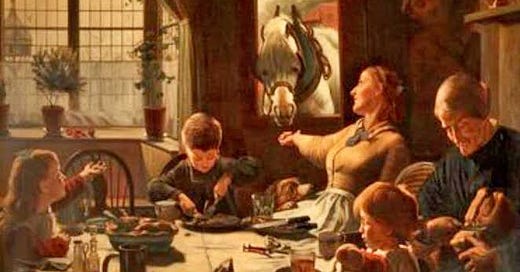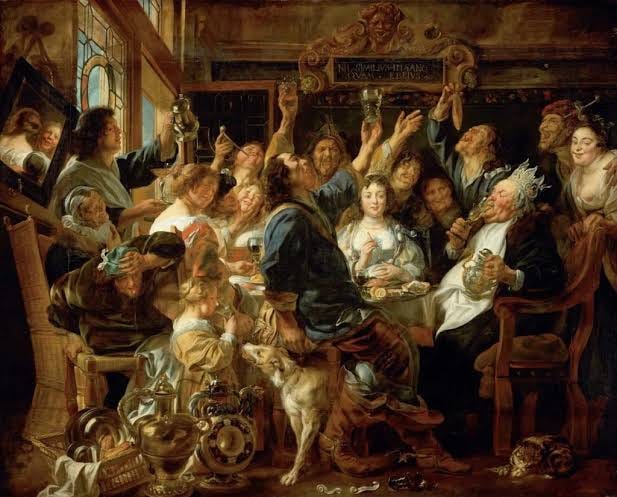It is in the realm of what our more prosaic contemporaries call 'the blur' that we encounter the most profound manifestation of communal consciousness. Here, in the space between sobriety and transcendence, have you chosen to be autonomous today, we may find the truth behind the polished veneer, in our failures, in our resilience, and in our flawed, fragile attempts at togetherness.
*cues Arrival of the Birds by The Cinematic Orchestra and the London Metropolitan Orchestra.
‘December 2008, when the evening light gilded the mansions at the GRA and the sound of highlife drifted like perfume across manicured lawns, I first encountered the curious ritual of the Oláwámirí family dinner. They were of old money, or at least money old enough to have forgotten its origins in cocoa and timber, there were even rumours of involvement in slavery, but let it not be heard that I gossip. You will not hear such from my mouth. Their dining room also gleamed with the sort of opulent desperation that marks those who have everything except the ability to enjoy it.
The table was a magnificent piece of mahogany. It stretched like an accusation across the room, one that seemed to groan under the weight of silver and crystal and unspoken expectations. Mrs. Oláwámirí — Helen to her friends, though I never quite reached that precipice of familiarity — presided over these affairs with the practiced grace of a conductor leading an orchestra no one had come to hear. Her children, three perfect specimens of privileged upbringing, sat like decorated generals at a peace conference, their postures suggested both supreme confidence and utter defeat. They couldn't even tilt their necks as they wished.
The servants moved like shadows, replacing plates with the synchronicity of Atilogwu dancers. This one reminded me of my time at the music club, except I was never in sync with the team. I was sinking the club. Then I joined The Road Safety Club. Fortunately for car owners and pedestrians, I never got a chance to practice. Rather than move like shadows, I remained as one, for everyone’s sake.
The Christmas season brought its own spectacular metamorphosis to the Oláwámirí household. The air grew heavy with the scent of exotic spices that would make the Buchanan's imported French potpourri seem childish in comparison. In the kitchen, battalions of fowl were transformed into golden-skinned masterpieces. The preparation had all the ceremony of a coronation and twice the importance.
I remember particularly the Christmas of '12, when young Olaide Oláwámirí returned from Birmingham with three classmates in tow – bright young things with trust funds and tennis sweaters who had never seen chicken prepared with quite so much reverence. I perfectly understood them. It was in this same house I realized adìyẹ and chicken weren't the same thing. They watched, fascinated, as mountains of food emerged from the kitchen in waves that would have fed Gatsby's entire congregation of summer guests.
But it was later, in those blue hours when evening softens into night, that I witnessed the true alchemy of their world. Chief Oláwámirí had a library, the one of leather-bound books and crystal decanters of amber liquid. The younger crowd would gather around. I loved books, so I stuck around too. These children were beautiful, beautiful in that careless way that only the very young or very wealthy can achieve, with their laughter growing looser as the night deepened.
There was James Oláwámirí, who carried his Oxford education like a well-tailored suit, now dispensing wisdom with the same ease his father dispensed aged scotch. And Clara Wellington-Pierce, who had broken three engagements but never a confidence, her cigarette holder angled just so as she reclined on the Moroccan leather chaise. They were joined by others – faces that blurred together in memory like watercolours in rain – all of them bound by that peculiar trust that comes from sharing secrets and sins in equal measure.
I was reminded then of what old money knows but new money never learns: that true friendship, like true wealth, shows itself most clearly in what it chooses to overlook. These young people, with their imported educations and inherited grace, had mastered the art of selective blindness. They knew when to turn away from a friend's indiscretion, when to pretend not to notice a tear in the social fabric, when to laugh just a little too loudly to cover someone else's silence.
In those moments, watching them orbit each other like three catfish in a bowl of water, I understood something about privilege that had eluded me in all my years of observing the wealthy. It wasn't in their possessions or their pedigrees, but in their capacity for magnificent folly – and in having the resources to ensure that such folly never led to true catastrophe.
As I left that night, while the moon hanged like a pearl drop above the manicured gardens, I thought about how some people are blessed twice over – first with roots deep enough to anchor them, and then with wings strong enough to let them soar away from those very roots, secure in the knowledge that home would always welcome them back, no matter how far they strayed.
The Oláwámirís understood this double blessing, wore it as naturally as they wore their tailored clothes and their cultivated accents. They had mastered that most difficult of arts: being privileged without being imprisoned by it. And perhaps that, more than all the feasts and all the crystal, was their true inheritance.
Roots do not ask for permission to hold you. They just do. In my family, the act of asking is but a courtesy, a whispered formality in the winds of inevitability. They do not wait for my permission or the utterance of need to perform. To me, family is a daylight mask, the one that never slips away. It is easy with these ones. You know it is time to have dinner when the sun had softened to a gentle orange and the streets of our home had begun to go quiet. You know it is morning when the light bulbs are on and the breakfast aroma starts to disturb your nostrils, a little background music here and there. Without education, I knew this was my tribe.
I was taught to hold space. Our dining table was a magnificent contraption of wood and it stretched out like the arms of God, ready to embrace anyone who wandered in with an empty stomach or a heavy heart, but like God himself, you could only experience, not see. One more cousin, uncle, that unexpected guest, that neighbor who "just came to greet" but somehow arrived exactly at dinner time. My mother will simply whisper a few words into my sister's ear and in few minutes time, food has arrived. I never found out where this extra food came from. Didn't I just pack the last one?
In my house, when the air grows suffocating, we carve out spaces to breathe. When darkness cloaks every corner, we force our eyes open wide, straining against the void to find each other, to lead one another through the endless abyss. And even when hunger gnaws at the edges of our resolve, and our legs falter beneath the strain, she will look at me and say, “A ma jẹun, ó kù dí è,” not as a suggestion, but as a prophecy. And somehow, mysteriously, there would always be space for another spoonful of my mother's special stew.
And while we're still on the subject of things that don't improve the digestion, I must now relate to you the curious custom of what I call "the blur" -- a state of being that occurs when good sense has gone to bed but the body remains obstinately awake. I have known many a man who achieved his finest moments of philosophical clarity in this condition, though peculiarly, such wisdom rarely survived until breakfast.
Drinking is not one of the wisest decisions, but have we not seen how the strongest bonds are forged in the crucible of shared folly? You see, there's a certain kind of friendship that only crystallizes in the blur, like palm oil separating from water in your mother's pot.
A couple weeks ago, this was my situation. We drank so much wine, told stories that grew more outrageous with each glass, and in the blur of that evening, I saw how we had created our own family, bound not by blood but by chosen kinship. I have a theory that friendship is best measured not in years but in the number of bad decisions you've survived together.
Folks, this is what I have learned from the Oláwámirís and my mother’s dining tables — that community is built in these moments of shared vulnerability, in the passing of plates, in the unspoken understanding that we hold each other's stories as carefully as we hold the last piece of chicken. I have found that family extends beyond blood, that friendship is its own kind of sustenance, and that sometimes the most profound acts of love come disguised as simple invitations to dinner and to parties.
In the end, it's all about returning — to the familiar scent of curry and thyme, to friends who know your history without explanation, to the understanding that home is not a place but a feeling of being known completely and loved anyway. We are what we remember, what we cook, who we choose to keep close.
Looking back now, across the gulf of years, I see those evenings for what they were – not mere dinners or parties, but ceremonies of belonging, rituals that bound together family and friends in ways that neither time nor distance could quite unravel. It was beautiful, and like all beautiful things, it carried within it the seeds of its own ending – but that's another story, for another time.
Happy new year, good people. Third year of Adésètó’s Substack. Thank you for being a rock that rocks.🤭❤️






Lovely peace. Beautiful, easy to digest and downright magical. I simply had to subscribe. Looking forward to more
You never seize to capture my wonder